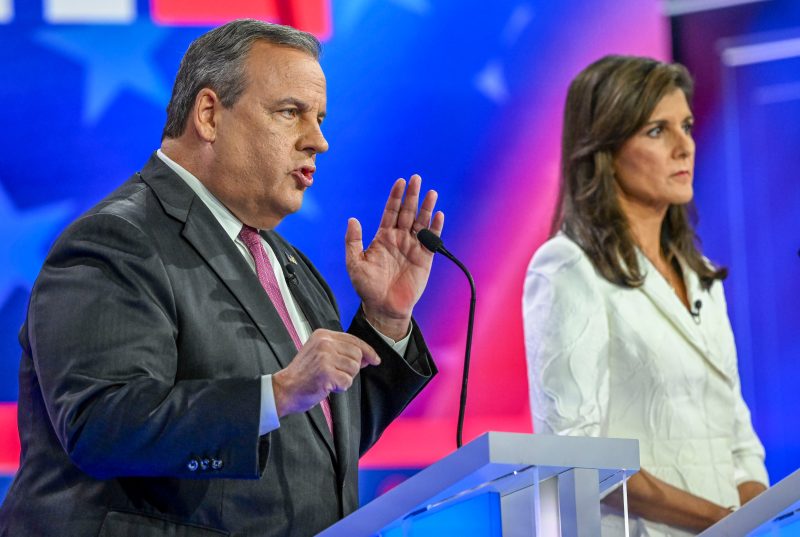Donald Trump’s campaign greeted the news that Chris Christie was ending his presidential bid with a memo making the case that it wouldn’t matter much — and particularly that it wouldn’t benefit Nikki Haley.
Instead, the memo reinforced the idea that this is something that could indeed help Haley, at least in the all-important New Hampshire primary, where Haley hopes for a win that could theoretically recast the Trump-dominated GOP primaries.
I’ve made the case before that Christie’s dropping out could be a boon to Haley in the Granite State. Here’s why:
Christie was actually pulling significant support there, generally running in third place with double-digit support. The most recent CNN poll showed the former New Jersey and South Carolina governors combining for more votes than Trump (though other polls haven’t quite shown that).Virtually all of Christie’s support came from the political middle and anti-Trump voters. That CNN poll showed he took 23 percent of voters who weren’t registered Republicans, 26 percent of moderates and 40 percent of left-leaning voters. A previous CNN poll showed a majority of his supporters backed President Biden in the 2020 general election. (New Hampshire has an open primary, allowing voters who aren’t registered with a party to participate.)Haley, a more traditional pre-MAGA Republican than her opponents, would seem to have the most potential appeal to those voters, given she draws from the same groups. For instance, she took the vast majority of 2020 Biden supporters who weren’t backing Christie. And her appeal has spanned the party more than that of Trump or Florida Gov. Ron DeSantis.
All the caveats that generally attend this kind of analysis apply. Voters don’t always revert to the most ideologically or tonally similar candidate when making their second choice. And it’s possible that many Christie supporters just sit this one out.
But there’s evidence that lots of them could vote — and in significant numbers — for Haley.
For instance, that earlier CNN poll showed Biden 2020 voters accounted for 20 percent of the GOP primary electorate and a huge majority of Christie’s support. While Haley took about one-third of them, another one-third listed her as their second choice. Only 1 in 10 said their second choice was to stay home.
Also, a new Suffolk University poll in Iowa showed Haley gaining the most in a race without Christie. Christie was at just 2 percent, but Haley’s support went up by two points in a race without him. Every other candidate registered the same percentage without Christie.
Beyond that, the Trump campaign’s argument on this front is not that compelling.
Notably, it shared its own polling data — not of a race without Christie, but of a race without Christie, DeSantis and Vivek Ramaswamy. Trump led Haley by 16 points (56-40) head-to-head in Iowa and by eight points (52-44) in New Hampshire.
Those are Trump leads, but not overwhelming ones. They also suggest significant gains for Haley that probably include plenty of Christie backers.
The Iowa numbers are particularly surprising. The current FiveThirtyEight average shows Trump at 52 percent and Haley at 18 percent in a crowded field. So his own polling shows his support barely higher in a head-to-head, but Haley’s doubling.
In New Hampshire, the polling average is Trump 41, Haley 30. Her support appears to rise more than Trump’s does in a head-to-head race. And given that DeSantis and Ramaswamy are more MAGA, it’s likely that the projections for Haley are owed in large part to Christie backers.
It might not be enough for Haley to pull off the win in New Hampshire. But Trump’s eight-point edge is also in a hypothetical matchup that doesn’t include DeSantis and Ramaswamy, who are still in the race for now. The ideal circumstance for Haley would seem to be that one or both of them stick around and pull at least a handful of MAGA-inclined voters, thus lowering Trump’s vote share.
What the Trump memo also betrays? The potential start of an attempt to explain away a potential positive result for Haley in New Hampshire.
While casting doubt on the idea that Christie supporters will do much for Haley, it also pitches them as being Democratic-leaning voters who are “invading the Republican primary” because Biden isn’t on the Democratic primary ballot. The Trump campaign could certainly — and credibly — spin an underwhelming night as being the result of an unusual electorate that won’t be replicated in future primary states.
Time will tell. But for now, Christie just opened the door a bit wider to an actually competitive race for the GOP nomination — however unlikely that is. (Christie, for one, appears to think that Haley will get “smoked” regardless.)
And the most interesting early primary state just got more interesting.

